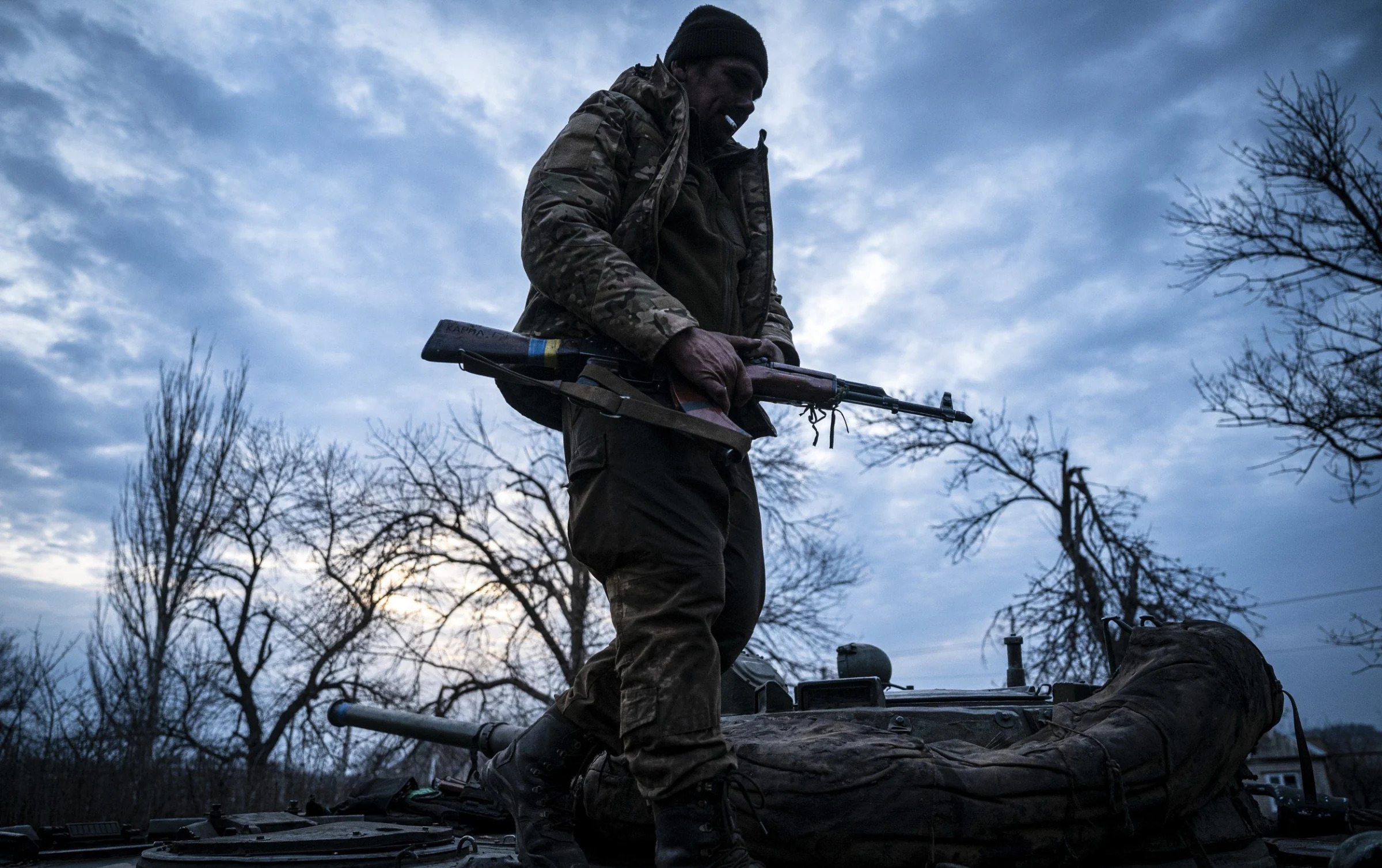Despite the horrors on display in Gaza, the war on Ukraine has far greater significance for Britain’s future security and prosperity. Take a step back, and it is clearly the prospect of nuclear war and Putin’s forces sweeping ever-westwards that demands our utmost attention.
A Ukrainian serviceman from the Special Operations Forces 214 Brigade.
Yes, Middle Eastern terror groups threaten us with attacks. But these are limited, and lack the ability to engage in the sort of tyrannical subjugation Putin would dearly like to try in Ukraine. And they do not have the ability to send deadly strategic nuclear warheads streaking across the skies.
Yet President Zelenskyy is clearly beginning to become exasperated as the West is distracted by affairs elsewhere. After 20 months of continuous warfare, the recent sackings of generals and security officials show a deep frustration with the state of the war.
Supplies of Western weapons and ammunition are drying up, and apparently being diverted to the eastern Mediterranean. The elections in the US, and the UK next year, could prove fatal to the continued flow of armaments.
Conversely, Russia is heading for a “total war” footing. Combine all sources of spending, and military expenditure could easily pass 10 per cent of GDP this year. The Kremlin is willing to throw its youth into the meatgrinder of the Donbas, while Ukraine’s soldiers at the front have an average age of over 40. And, of course, Putin faces no risk of losing the “elections” next year. This total commitment could tip the balance – and Zelenskyy knows it.
The essay “Modern positional warfare and how to win it” by General Valerii Zaluzhnyi, Commander-in-Chief of the Armed Forces of Ukraine, is on the face of it a very honest and realistic assessment of the current state of the war. It is also a warning to the West that Russia is far from vanquished.
Suggesting that things have reached a stalemate is not admitting defeat, yet there are some subtle messages within its pages – as much for Russian consumption as for Ukraine’s backers, I expect.
Nobody thought that in the 21st Century pure numbers of soldiers would be as important as they were at the turn of the 20th Century. Russia has reportedly lost over 300,000 soldiers in the 20 months of this war. Yet, ensconced in the Kremlin, Putin is insulated from the political consequences of this wholesale destruction of Russia’s future.
Positional warfare allows the Russians to keep pouring barely trained soldiers into the trenches, who only need to hold and fire a gun. Ukraine, on the other hand, does not have safe training areas for its recruits, and I believe the General is politely “screaming” at the West to do the heavy lifting in this area.
Zelensky’s constant request has been for new weaponry to shift the needle. In 1917, in the trenches of the first world war, it was the tank that showed the way. At the time, too many did not realise their potential, as they were used piecemeal and not part of a comprehensive and combined arms approach. Yet as a former tank commander I gauge that the tank action at Cambrai on 20 November 1917 is no different to the tank action in 2023 in the Donbas. It will break the stalemate if we meet the commitments Zelensky is shouting for – particularly if we also provide the missing piece in modern fighter jets.
Above all, we in the West must realise that it is events in Europe that will shape our destiny far more than those in the eastern Mediterranean. We must provide everything Ukraine needs to win; otherwise, there is the real prospect they may lose, and bring a dark cloud down on Europe which we have not seen since 1939.
US reduces artillery shells supply to Ukraine by more than 30%.
The US has cut supplies of vital NATO-standard ammunition to Ukraine by "more than 30%" since the start of Israel's war against Hamas in Gaza last month, ABC News reported, citing an unnamed Ukrainian official.
Quote: "155mm artillery shells are arguably the most important munition for Ukraine in its fight against invading Russian forces, and some U.S. stocks, which were designated for Ukrainian forces, have been diverted to Israel."
Details: In recent weeks, American officials have repeatedly stated that the supply of weapons to Israel will not have any impact on the war in Ukraine.
"They (U.S. officials) were telling us it wouldn’t influence the commitments (from the U.S.), but it did," a Ukrainian official said.
The official, who spoke to ABC News anonymously, said the supply of these vital artillery shells is "about 60-70% of Ukraine’s overall supply".
A senior US defence official, however, told ABC News that the ammunition cuts had "absolutely nothing to do with what's happening in Gaza".
He said that packages of the president's drawdown authority packages "start to get put together weeks in advance, so there is no link between what's happening in Gaza to what’s happening in Ukraine".
At the same time, during his visit to Ukraine, Lloyd Austin, the United States Secretary of Defense, announced a new package of security assistance to Ukraine worth US$100 million, which includes an unspecified number of 155-mm artillery shells that meet NATO standards.
Background: The US Department of Defense on 20 November revealed the contents of the new US$100 million military aid package for Ukraine. The new package will contain one HIMARS multiple-launch rocket system and additional ammunition for it, Stinger anti-aircraft missiles, 155-mm and 105-mm artillery shells, TOW anti-tank missiles, and Javelin and AT-4 anti-tank systems.




